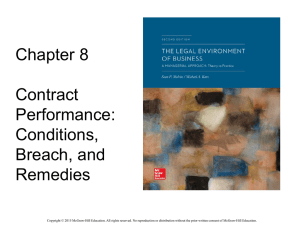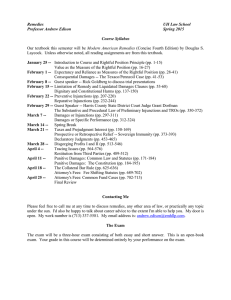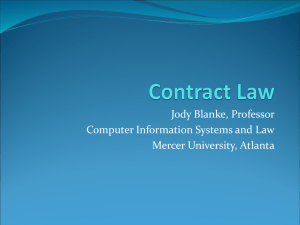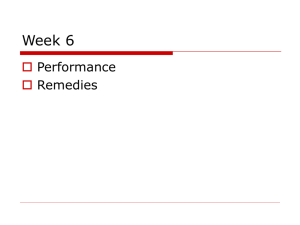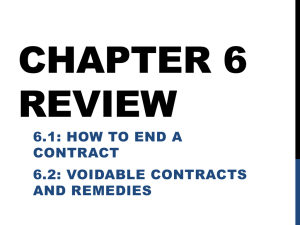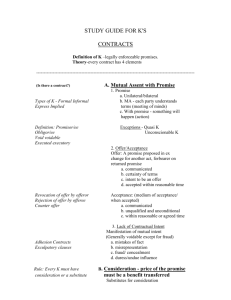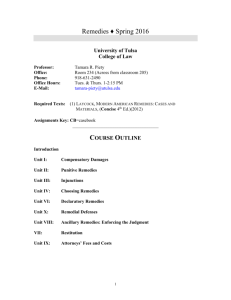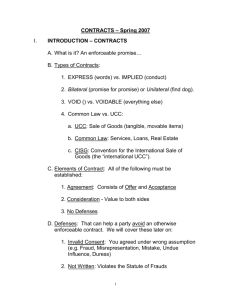Contracts Revision Session 1
advertisement
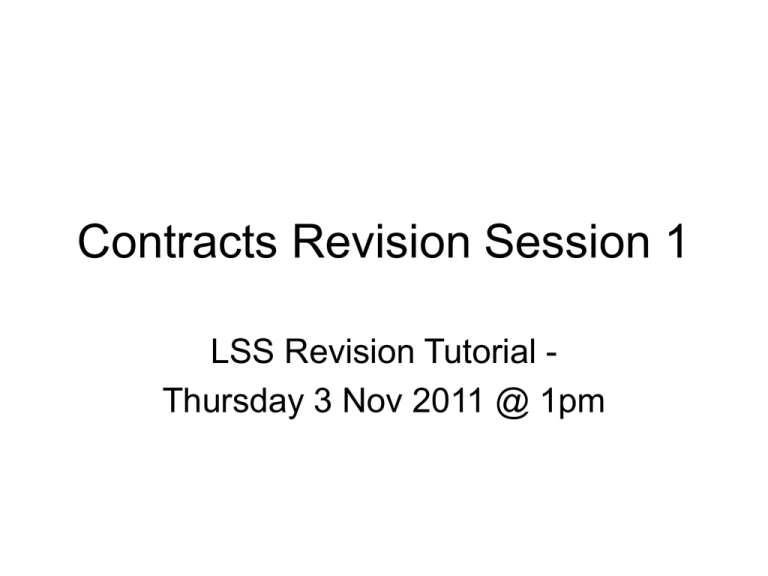
Contracts Revision Session 1 LSS Revision Tutorial Thursday 3 Nov 2011 @ 1pm Coping with Contracts • Need to be linear and chronological (don’t just seize on the first issue you see). • Need to develop your own summary that is based on the life-cycle of the contract, includes the issues that crop up at each stage, the rules for how to deal with those issues, and authority for them. • Cases are crucial - but not much use if you don’t know where they fit into the bigger picture. • Closed book exams don’t have to be as scary as they seem - you can fit a lot on 4 pages if you are taking notes on the right things (and are strategic about how you prepare) This session • Holistic view of the course • Not cover rules from cases specifically • How to prepare for the exam Note: this covers the topics that we did in Semester 1 2011 - some of these may have changed for you… Life-cycle of the Contract Formation (is there a contract?) Construction (what are the terms of the contract?) Discharge (was the contract performed? Breached? Frustrated?) Remedies (what remedies are available if things have gone wrong?) Vitiating Factors (what other underlying issues need to be considered?) Formation Offer • What constitutes an offer • Duration of offer • Termination of offer Acceptance • Rules of Acceptance • Revocation of Acceptance Consideration • What is and isn’t ‘good’ consideration Formation (cont…) Uncertainty and Incompleteness • Illusory, Incomplete and Uncertain contracts (know the difference!) • What happens if court decides it is one of these? • ‘Subject to’ contracts (subject to finance, subject to written contract) Agreements to Agree/Negotiate • Are they enforceable? • In what circumstances? Formation (cont…) Intention to Create Legal Relations • Commercial and domestic presumptions Requirement of Writing • Statute of Frauds (which contracts need to be in writing?) • Rules for notes or memorandums of contract • What happens if not in writing and should be? Estoppel • What is it? • When might it apply? Construction Express terms • what is written / actually said • Decide if puff, mere representation or actual term Incorporation of terms • By signature • By notice (ticket cases) • By course of dealing • By reference Construction (cont…) Implied terms • By fact • By common law • By statute • By custom and usage Things affecting application/interpretation of term: • Privity • Parol Evidence Rule • Limitation and Exclusion Clauses Collateral Contracts Discharge Breach • Late performance (time stipulations, notices to perform) • Defective performance (substantial performance) • Non performance (order of performance) Frustration • In what circumstances? Discharge (cont…) Right to Terminate? • Why want it? • Under what circumstances is it available? • What constitutes affirmation? • What constitutes repudiation? Remedies Damages • Substantive v Nominal • Unliquidated damages (expectation damages, reliance damages) • Liquidated damages (become debts) Equitable remedies (know what and when) • Promissory estoppel • Specific performance • Injunction Vitiating Factors Duress • Physical duress • Economic duress Undue Influence • Presumed • De facto presumed • Actual Unconscionable Conduct • Common law • Statute (ACL) Vitiating Factors (cont…) Misrepresentation and Misleading Conduct • Fraudulent • Negligent • Innocent • Statute (ACL) • Remedies? Mistake • Unilateral • Common • Mutual • Non est factum • Rectification of documents Your challenge: 1. For each topic: make a list of the rules that govern it with the authority for that rule in brackets. 2. Identify which topics you don’t understand as well as others and re-read lecture notes, cases, etc. If you are still unsure, email your tutor and ask questions. 3. Refine this to a 4 page summary (be creative with font, colour, formatting). 4. Consider flash cards for cases - rule one one side case name on the other and use these for revision. 5. Test out your summary by doing a practice exam (even if it’s just issue-spotting) - and refine the summary. Tomorrow’s session • Exam techniques for Contracts


